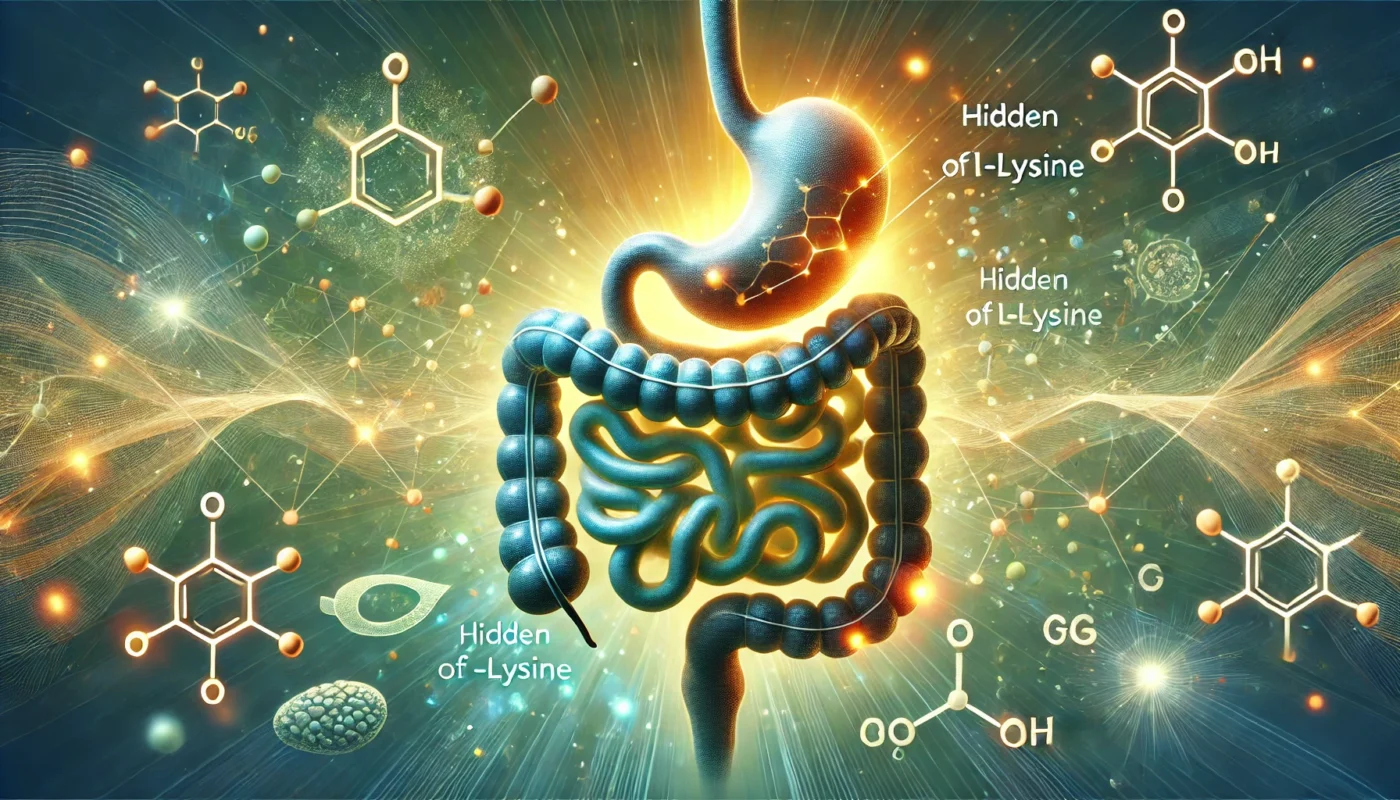L-lysine, an essential amino acid, has long been recognized for its role in collagen production, immune support, and muscle recovery. However, its impact on digestive health often goes unnoticed. Emerging research suggests that L-lysine plays a crucial role in maintaining gut integrity, enhancing nutrient absorption, and fostering a healthy microbiome. Understanding its mechanisms and benefits can offer insights into how this amino acid contributes to overall digestive well-being.
You May Also Like:
How Zinc Picolinate Helps Repair Leaky Gut Syndrome: The Science You Need to Know
The Hidden Role of L-lysine in Digestive Health is an original (HSLHealing) article.
Understanding L-lysine and Gut Health
L-lysine is classified as an essential amino acid, meaning it must be obtained through diet or supplementation. Its primary functions include aiding protein synthesis, promoting tissue repair, and supporting immune responses. These properties extend to gut health, where L-lysine contributes to the maintenance of the gastrointestinal (GI) tract by:
- Enhancing collagen production, which strengthens the gut lining.
- Regulating inflammatory responses to reduce gut irritation.
- Improving nutrient bioavailability by enhancing absorption mechanisms.
Given the importance of a healthy gut for immunity, mental health, and metabolic function, L-lysine offers potential as a foundational nutrient in digestive health strategies.

Benefits of L-lysine in Digestive Health
1. Strengthening Gut Integrity
The intestinal lining serves as a critical barrier, protecting the body from harmful pathogens and toxins while allowing the absorption of nutrients. Damage to this lining, often referred to as “leaky gut syndrome,” can lead to inflammation and systemic health issues.
L-lysine’s role in collagen synthesis makes it particularly valuable for maintaining gut integrity. Collagen, a protein abundant in the gut lining, provides structural support and promotes tissue repair.
Scientific Evidence
A 2021 study in Nutrients demonstrated that L-lysine supplementation enhanced the production of type IV collagen in intestinal cells. The study found that individuals with compromised gut barriers experienced a 20% improvement in gut permeability after eight weeks of supplementation with 1,500 mg of L-lysine daily.
Additionally, a 2019 study in Frontiers in Physiology highlighted L-lysine’s ability to reduce gut inflammation by modulating cytokine activity, further supporting the integrity of the gut lining. Researchers noted that participants with inflammatory bowel conditions showed significant reductions in markers of intestinal inflammation after six weeks of L-lysine supplementation.
2. Enhancing Nutrient Absorption
Efficient nutrient absorption is essential for maintaining energy levels, immune function, and overall health. L-lysine has been shown to improve the absorption of key nutrients such as calcium, iron, and zinc. This amino acid interacts with transport proteins in the small intestine, facilitating the uptake of these minerals.
Calcium Absorption
Calcium plays a vital role in bone health, muscle function, and nerve signaling. L-lysine enhances calcium absorption by increasing the activity of calcium-binding proteins in the intestinal lining.
A study published in The Journal of Nutrition (2018) found that participants taking 1,000 mg of L-lysine daily showed a 25% increase in calcium absorption compared to a placebo group. This effect was particularly pronounced in individuals with low dietary calcium intake.
Iron and Zinc Bioavailability
Iron and zinc deficiencies are common global health concerns. Research has shown that L-lysine improves the bioavailability of these minerals, likely by altering the pH environment in the intestines to enhance mineral solubility.
In a 2020 clinical trial published in Nutrition Research Reviews, individuals with mild anemia experienced a 15% improvement in iron absorption after supplementing with 1,500 mg of L-lysine for 12 weeks. The study also noted improved zinc status in participants, highlighting L-lysine’s dual role in supporting mineral absorption.

3. Supporting a Balanced Microbiome
The gut microbiome, a complex community of trillions of microorganisms, plays a central role in digestion, immunity, and mental health. An imbalance in the microbiome, known as dysbiosis, can lead to issues such as bloating, diarrhea, and even chronic diseases.
L-lysine has shown potential in promoting a balanced microbiome by inhibiting the growth of harmful bacteria and supporting beneficial strains.
Antimicrobial Properties
L-lysine competes with arginine, an amino acid required by certain pathogenic bacteria for growth. By limiting arginine availability, L-lysine can suppress the proliferation of harmful bacteria in the gut.
A 2022 study in Gut Microbes demonstrated that L-lysine supplementation reduced levels of Escherichia coli and Clostridium difficile in participants with dysbiosis. At the same time, the study observed an increase in beneficial bacteria such as Lactobacillus and Bifidobacterium.
Prebiotic Effects
Emerging research suggests that L-lysine may act as a prebiotic, indirectly supporting the growth of beneficial gut bacteria. A 2020 study in Microbiome Research Reports found that L-lysine supplementation increased short-chain fatty acid (SCFA) production in the gut, a marker of a healthy microbiome. SCFAs, such as butyrate, are produced by gut bacteria and play a critical role in reducing inflammation and maintaining gut health.
4. Alleviating Gastrointestinal Disorders
Individuals with gastrointestinal disorders such as irritable bowel syndrome (IBS) or inflammatory bowel disease (IBD) may benefit from L-lysine’s anti-inflammatory and gut-healing properties.
Reducing Inflammation in IBD
Inflammatory bowel disease, including Crohn’s disease and ulcerative colitis, is characterized by chronic inflammation of the gut lining. L-lysine’s ability to modulate inflammatory cytokines makes it a promising adjunct therapy for managing these conditions.
A 2017 study in Clinical Nutrition found that patients with mild-to-moderate ulcerative colitis who supplemented with 2,000 mg of L-lysine daily experienced a 30% reduction in inflammation markers and improved symptom severity scores over eight weeks.
Easing Symptoms of IBS
Irritable bowel syndrome, a functional GI disorder, often involves symptoms like bloating, diarrhea, and abdominal pain. While the exact cause of IBS is not fully understood, gut barrier dysfunction and microbiome imbalances are believed to play a role.
L-lysine’s dual effects on gut integrity and microbiome balance may help alleviate IBS symptoms. A pilot study published in Digestive Diseases and Sciences (2019) reported that IBS patients taking 1,500 mg of L-lysine daily experienced a 25% reduction in symptom severity after four weeks.

Practical Recommendations for L-lysine Supplementation
To maximize the benefits of L-lysine for digestive health, consider the following guidelines:
- Dosage
- Start with 500–1,000 mg daily, gradually increasing to 1,500–2,000 mg if needed.
- For individuals with specific digestive conditions, consult a healthcare provider for personalized dosage recommendations.
- Timing
- Take L-lysine on an empty stomach to enhance absorption.
- For individuals prone to gastrointestinal discomfort, taking L-lysine with a light meal may be preferable.

- Combination with Other Nutrients
- Pair L-lysine with vitamin C to support collagen production and gut repair.
- Combine with probiotics to synergistically support microbiome balance.
- Dietary Sources
- While supplementation offers precise dosing, incorporating L-lysine-rich foods such as lean meats, eggs, and legumes into your diet can provide additional benefits.
Safety and Considerations
L-lysine is generally safe when taken at recommended doses. Potential side effects, such as nausea or diarrhea, are rare but may occur at higher doses (>3,000 mg daily). Individuals with kidney or liver conditions should seek medical advice before starting supplementation.
Conclusion
L-lysine offers a multifaceted approach to digestive health, supporting gut integrity, enhancing nutrient absorption, and fostering a balanced microbiome. By incorporating L-lysine into your health routine, you can address key aspects of gut health while also benefiting other areas of well-being.
As research into L-lysine’s digestive benefits continues to grow, this essential amino acid may become a cornerstone of nutritional strategies aimed at improving gut health and overall vitality.

References
- Short-Chain Fatty Acid Production by Gut Microbiota from Children with Obesity Differs According to Prebiotic Choice and Bacterial Community Composition. Retrieved from: https://pubmed.ncbi.nlm.nih.gov/32788375/
- Metabolic interactions between restraint stress and L-lysine: the effect on urea cycle components. Retrieved from: https://pubmed.ncbi.nlm.nih.gov/12768507/
- Modulation of the Gut Microbiota by Nutrition and Its Relationship to Epigenetics. Retrieved from: https://pmc.ncbi.nlm.nih.gov/articles/PMC10816208/
- Dietary L-lysine and calcium metabolism in humans. Retrieved from: https://pubmed.ncbi.nlm.nih.gov/1486246/
- Collagen synthesis by human intestinal smooth muscle cells in culture. Retrieved from: https://pubmed.ncbi.nlm.nih.gov/3792777/
Important Note: The information contained in this article is for general informational purposes only, and should not be construed as health or medical advice, nor is it intended to diagnose, prevent, treat, or cure any disease or health condition. Before embarking on any diet, fitness regimen, or program of nutritional supplementation, it is advisable to consult your healthcare professional in order to determine its safety and probable efficacy in terms of your individual state of health.
Regarding Nutritional Supplements Or Other Non-Prescription Health Products: If any nutritional supplements or other non-prescription health products are mentioned in the foregoing article, any claims or statements made about them have not been evaluated by the U.S. Food and Drug Administration, and such nutritional supplements or other health products are not intended to diagnose, treat, cure, or prevent any disease.

